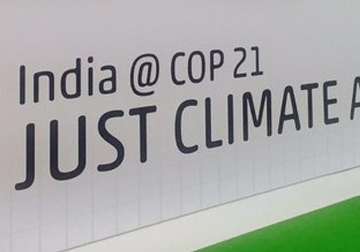Le Bourget, France: India has expressed satisfaction with the first draft of the climate change accord released here with the new document retaining all its inputs as negotiators made "some progress" in hammering out a deal.
"At the moment this is a shorter draft but everything which we (India) got inserted is still there. It's five pages shorter," India's key negotiator Ajay Mathur said at the UN climate conference. He said French President Francois Hollande has spoken of "urgency" of moving ahead in resolving issues and India will continue to work together to get closer to an agreement.
Following three days of hectic parleys over a complex 54-page draft pact, negotiators released a document five pages shorter but still there was reportedly no agreement on about 250 undecided options across the text.This is the more or less the same text which was released in the Bonn conference, officials said. India also sought global support for bringing down the cost of renewable power to reduce reliance on coal.
Elaborating on the process in talks, Mathur said the negotiation text as evolved by the various discussion groups would be consolidated and handed over to the presidency who will then create spin off groups on various unresolved issues that will then be the focus of negotiations.
"We are encouraged that on fourth day, we had some progress. We agree with the presidency that we need to move ahead. There is a huge amount of work in progress which we hope will move towards a greater degree of competition before the presidency takes over the text and starts discussion. We are pleased with fact that progress has been made," he said on Thursday.
Climate Action Network International, consortium of NGOs across the world working on climate change, said the new draft is shorter by five pages than the previous version as options have been condensed and streamlined across different issues.
Raman Mehta of the Vasudha Foundation, which is a member of the consortium, said that there were nations who are saying that the current paradigm of differentiation has outlived its use and are asking to replace it with the concept of total symmetry.
"This is unfair and it doesn't acknowledge the many serious differences that remain between nations. Delegates could create an equitable new paradigm on differentiation, but that framework has yet to be constructed," Mehta said.
Meanwhile, UN Secretary General Ban Ki-moon said he would continue to press developed countries to recognise their responsibility to take the lead, while urging developing countries to do more in line with their growing capabilities.
Latest World News
